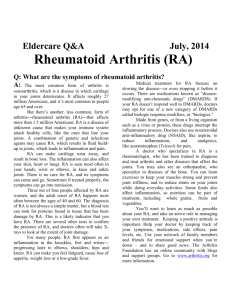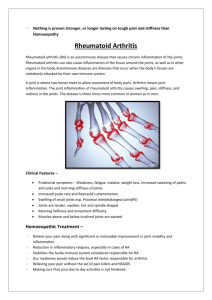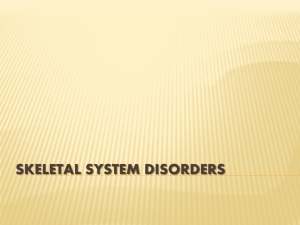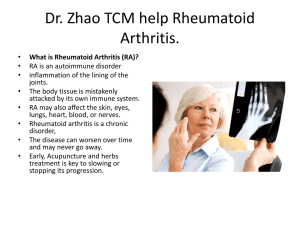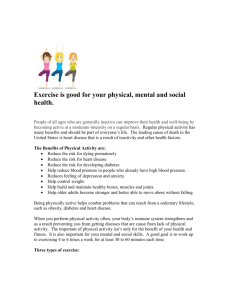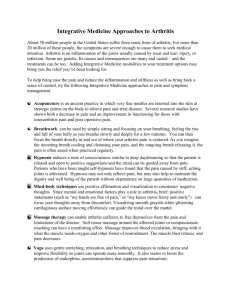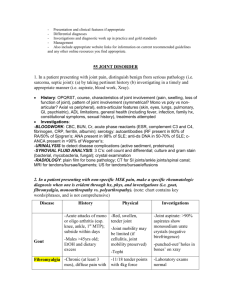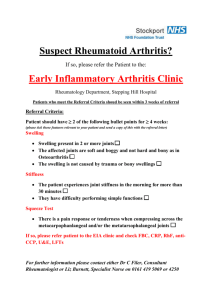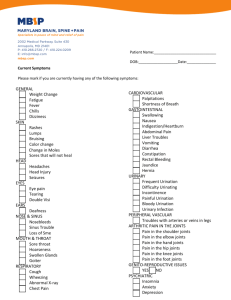File
advertisement
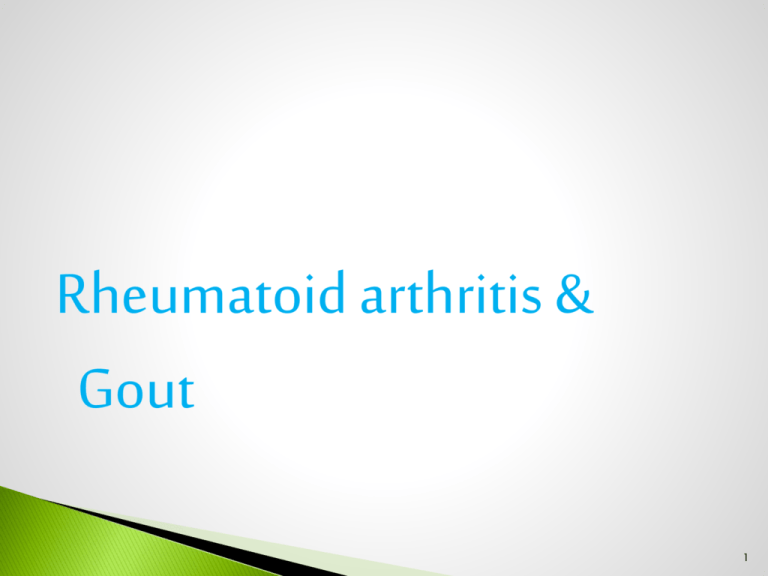
Rheumatoid arthritis & Gout 1 (RA) is an autoimmune disease that causes chronic inflammation of the joints & can also cause inflammation of the tissue around the joints . Inflammatory arthritis Peak incidence in 3rd to 4th decades( )عقودof life 3-5 times higher preponderance( ( يكثرin females than males 2 3 Exact mechanism is not known 1) Autoantibody-Rheumatoid factor(R.F.) : R.f. is Anti-IgG 2)other autoantibodies: Antinuclear factor(ANF) Antibodies to Collagen type-2 class Antibodies to cytoskeleton 4 3) Activation of cell-mediated immunity which is observed by numerous inflammatory cells 4)Trigger events :Local/systemic infection It includes some infectius agents such as Epstein-Barr Virus(EBV) cytomegalovirus(CMV) rubella 5 6 Longitudinal Course of RA CCP, cyclic citrullinated peptide; CTLA4, cytotoxic T-lymphocyte antigen 4; GP39, cartilage glycoprotein 39; PADI4, peptidyl arginine deiminase, type IV; PTPN22, protein tyrosine phosphatase, nonreceptor type 22. Reproduced with permission from McInnes IB, et al. Nat Rev Immunol. 2007;7(6):429442. 7 Tender , warm , swollen joints Joints inflammation often affect wrist & finger joints Also affect other joints including neck ,shoulder ,elbow ,hips ,knees ,ankles ,feet Fatigue ,occasional fever ,sense of not feeling well Pain & stiffness after morning wake up or after a long rest 9 By imaging: X-ray MRI Ultra sound By Blood tests: a)Inflammatory markers: ESR(erythrocytes sedimentation rate) C reactive protein(CRP) ANA(anti-nuclear antibody) b)Rheumatoid factor: c)Anti-ccp antibodies : it in 99% gives +ve result d)Anti-MCV assay(anti-Mutated citrullinated Vimentin) 10 There is no cure for RA,there is some treatments which can modify the disease process. GOAL for Treatments : 1. Relieve pain 2. Reduce inflammation 3. slow down or stop joint damage 11 1)medication 2)surgery 3)lifestyle 1)medication: Classification: 1. 2. 3. 4. 5. 6. Anti-inflammatory-analgesic drugs Anti-inflammatory drugs without direct analgesic action Disease Modifying Antirheumatic Drugs(DMRDs) immunosuppressants TNF-alpha blockers Interleukin-1 blockers 12 ANTIINFLAMMATORY-ANALGESIC DRUGS Eg.aspirin,indomethacin,ibuprofen,naproxen, piroxicam,nabumetone,diclofenac,celecoxib M.O.A: It inhibit pg,& chemicals that are responsible for pain and swelling 13 Ibuprofen-: Individuals should not use ibuprofen for more than 10 days for the treatment of pain or more than 3 days for the treatment of a fever unless directed by a physician Celecoxib: The lowest effective dose should be used for each patient GLUCOCORTICOIDS-:They are used when disease Is not responding NSAIDs. Have serious side effect incase of high doses Eg.prednisolone:- 14 Eg. Methotrexate Hydroxychloroquine Sulfasalazine Gold salts 15 METHOTREXATE: It is antimetabolite drug M.O.A: It inhibit dihydro folate Reductase enzyme. 16 It is antimalerial drug. Eg. Gold thioglucose(SOLGANAL) Gold thiomalate (MYOCHRYSINE) Auranofin (RIDAURA) Sulfasalazine is used to treat rheumatoid arthritis in combination with anti- inflammatory medications. Sulfasalazine is generally well tolerated. 17 17 Hip replacement Knee replacement SYNOVECTOMY 18 It is metabolic disorder characterized by hyperuricaemia Normal plasma=1-5 mg/dl Stages of gout:1. 2. 3. 4. asymptomatic hyperuricaemia acute gouty arthritis intercritical period chronic tophaceous stage 20 Types :1)metabolic-10% cases Over production of uric acid 2)renal- 90% cases Reduced renal excretion of uric acid Causes:1)genetic(absence of hypoxanthine) 2)medication:3)lifestyle 21 Drugs that causes hyperuricaemia : Alcohol Thiazide Cytotoxic drugs Amiloride Isoretinoin Ethambutol Cyclophosphamide 22 Acute attack: Over hours frequently nocturnal Excruciating pain Swelling, redness and tenderness Podagra May effect knees, wrist, elbow, and rarely SI and hips Chronic: Destructive tophacous Much greater chance if untreated nodules 23 DIAGNOSIS:1. X-ray 2. Synovial fluid test:3. Blood test: Normal level:1-5mg/dl Above 7 in males Above 6 in females indicate hyperuricaemia. W.B.C.,ESR is increased in gout without infection. 24 Uric acid is end product of purine metabolism Monosodium urate has low water solubility When conc. Of MSU is above 7mg/dl,their solubility is decreased due to saturation and it form crystal. 25 Goal of treatment: Relieve pain Reduce inflammation Terminate acute attack Prevent recurrent attack Prevent complications associated with chronic deposition of urate crysals in tissues. 26 Classification of drugs no cure alone) 1)NSAIDs 2)colchicine 3)corticosteroids 4)uricosuric drugs 5)xanthine oxidase inhibitor NSAIDs: Indomethacin Naproxen Piroxicam diclofenac 27 COLCHICINE: It is an alkaloid from colchicum autumnale. It is antimitotic drug. MOA it inhibit release of Glycoprotein & subsequent Events. It inhibit granulocyte Migration into inflamed joints. 28 CORTICOSTEROIDS: Eg.prednisolone They are rarely used.they are used in case of patient which is contraindicate to NSAIDs. they produce rapid response like colchicine.but it is contraindicated to patients with renal failure. 29 PROBENECID: It is uricosuric drug. MOA It is act by inhibiting reabsorption of uric acid.so,excretion of uric acid is increased. XANTHIN OXIDASE INHIBITOR: Eg.allopurinol. It is hypoxanthine analogue. MOA: It is act by inhibiting Xanthine oxidase which is required for synthesis of uric acid. 30 OA is a group of diseases and mechanical abnormalities entailing degradation of joints, including articular cartilage and the subchondral bone next to it OA is derived from the Greek word ‘ostoe’, meaning ‘of the bone’, ‘arthro’, meaning ‘joint’, and ‘itis’, meaning inflammation Osteoarthritis is the most common type of arthritis. The prevalence increases with age 80% of people over 60 years will have some radiological evidence of it, although only 60% of those will show symptoms. Primary Osteoarthritis Most Common Thought to be result of Aging Decreased ability to withstand stress Ligaments supporting joints weaken Causes Trauma Obesity Abnormal joints Surgery Gout Hormone disorders Diabetes To Relieve pain Increase motion Improve strength
